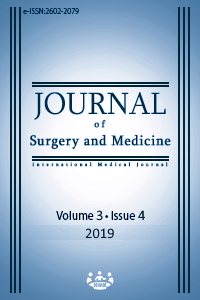Efficacy of complex decongestive therapy on breast cancer-related lymphedema: A cross-sectional study
Keywords:
Lymphedema, Complex decongestive therapy, Breast cancerAbstract
Aim: Lymphedema is a protein-rich interstitial fluid accumulation which occurs as a result disruption of lymphatic circulation. Breast cancer is a major reason of secondary cancer lymphedema. Breast cancer related upper extremity lymphedema result from the obstruction or disruption of the lymphatic system due to axillary lymph node dissection and/or radiation therapy of axillary region. A variety of conservative therapies have been aimed to decrease the limb swelling and its associated problems have been developed. Conservative treatments are complex decongestive therapy (CDT). The aim of our study was to investigate efficacy of CDT on the occurrence of breast cancer related lymphedema.
Methods: Between 2009 and 2018, 47 consecutive patients with histologically proven breast cancer were first treated with breast surgery, axillary lymph node dissection and radiotherapy and/or chemotherapy. These were analyzed collectively with retrospective data of our medical records who had 15-30 set of CDT and who had complete assessments before and after the treatment. CDT consists of the following components; skin care, manual lymphatic drainage, bandaging and exercises. Patients were treated with active therapy schedule (manual massage for lymphatic drainage and exercise therapy, 45-60 min per day) by the same trained physiotherapist. Volumetric quantification by circumference measurement of affected and healthy extremities was used for diagnosis and follow-up of lymphedema in all patients.
Results: The data of the 47 patients complying with the criteria specified in this retrospective study were evaluated. When the volumetric changes in the affected extremity were examined before and after lymphedema treatment, it was determined that the amount of lymphedema decreased after CDT (P=0.001). 31 (66%) patients received radiotherapy after mastectomy. When the patients were compared in terms of volumetric changes in extremities before and after CDT according to getting postoperative radiotherapy, it was determined that the changes in the patients who did not get radiotherapy were significantly higher than those getting radiotherapy (P=0.01).
Conclusion: Our study results show that CDT can be used for the management of breast cancer related lymphedema of limb. A thorough cost-effective analysis of protocol for CDT should be performed in a future study. In addition, as the factors underlying treatment delay were not included in this study, we believe future studies examining this area may be beneficial.
Downloads
References
Ezzo J, Manheimer E, McNeely ML, Howell DM, Weiss R, Johansson KI, et al. Manual lymphatic drainage for lymphedema following breast cancer treatment. Cochrane Database Syst Rev. 2015;5:CD003475. doi: 10.1002/14651858.CD003475.pub2
Badger C, Preston N, Seers K, Mortimer P. Physical therapies for reducing and controlling lymphoedema of the limbs. Cochrane Database Syst Rev. 2004 Oct 18;(4):CD003141. doi: 10.1002/14651858. CD003141.pub2
Rupp J, Hadamitzky C, Henkenberens C, Christiansen H, Steinmann D, Bruns F. Frequency and risk factors for arm lymphedema after multimodal breast-conserving treatment of nodal positive breast Cancer–a long-term observation. Radiation Oncology. 2019;14(1):39. doi: 10.1186/s13014-019-1243-y
Armer JM, Radina ME, Porock D, Culbertson SD. Predicting breast cancer-related lymphedema using self-reported symptoms. Nurs Res. 2003;52:370–9. doi: 10.1097/00006199-200311000-00004
Tambour M, Tange B, Christensen R, Gram B. Effect of physical therapy on breast cancer related lymphedema: protocol for a multicenter, randomized, single-blind, equivalence trial BMC Canc. 2014;239. doi: 10.1186/1471-2407-14-239
Cheville AL. Current and future trends in lymphedema management. Implications for women’s health. Phys Med Rehabil Clin N Am. 2007;18:539-53. doi: 10.1016/j.pmr.2007.06.001
Standring S. Gray's Anatomy: The Anatomical Basis of Clinical Practice (41st ed.), Elsevier Limited, New York; 2016. pp. 647-948.
Woods M. Risk factors for the development of oedema and lymphoedema. British Journal of Nursing. 2019;28(4):219–22. doi: 10.12968/bjon.2019.28.4.219
DiSipio T, Rye S, Newman B, Hayes S. Incidence of unilateral arm lymphoedema after breast cancer: a systematic review and meta-analysis. Lancet Oncol. 2013;14:500–15. doi: 10.1016/S1470-2045(13)70076-7.
Warren LEG, Miller CL, Horick N, Skolny MN, Jammallo LS, Sadek BT, Taghian AG. The Impact of Radiation Therapy on the Risk of Lymphedema After Treatment for Breast Cancer: A Prospective Cohort Study. International Journal of Radiation Oncology Biology Physics. 2014;88(3):565–71. doi: 10.1016/j.ijrobp.2013.11.232
Vieira RA, da Costa AM, de Souza JL, Coelho RR, de Oliveira CZ, Sarri AJ, et al. Risk factors for arm lymphedema in a cohort of breast cancer patients followed up for 10 years. Breast Care. 2016;11:45–50. doi: 10.1159/000442489
Andersen L, Højris I, Erlandsen M, Andersen J. Treatment of Breast-Cancer-related Lymphedema With or Without Manual Lymphatic Drainage: A Randomized Study. Acta Oncologica. 2000;39(3):399-405. doi: 10.1080/028418600750013186
Szolnoky G, Lakatos B, Keskeny T, Dobozy A. Advantage of combined decongestive lymphatic therapy over manual lymph drainage: A pilot study. Lymphology. 2002;35(suppl 1):277–82.
Bunce IH, Mirolo BR, Hennessy JM, Ward LC, Jones LC. Post-mastectomy lymphoedema treatment and measurement. Med J Aus. 1994;161:125–7.
Moseley A, Carati C, Piller N. A systematic review of common conservative therapies for arm lymphoedema secondary to breast cancer treatment. Annals of Oncology. 2026;18(4):639–46.
Rogan S, Taeymans J, Luginbuehl H, Aebi M, Mahnig S, Gebruers N. Therapy modalities to reduce lymphoedema in female breast cancer patients: a systematic review and meta-analysis. Breast Cancer Research and Treatment. 2014;159(1):1–14. doi: 10.1007/s10549-016-3919-4
Downloads
- 1668 2150
Published
Issue
Section
How to Cite
License
Copyright (c) 2019 Nehir Samancı, Özlem Karataş, Ayşegül Samur, Ali Çipli, Nilüfer Balcı
This work is licensed under a Creative Commons Attribution-NonCommercial-NoDerivatives 4.0 International License.
















